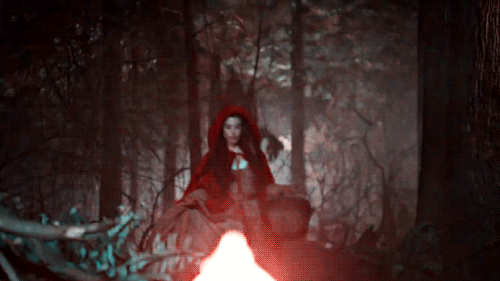Werewolf Grandmas
So if I say “werewolf grandmas,” what’s your first thought? I bet I know what it is.

I bet it’s Little Red Riding Hood, right? Because it includes a grandma and it’s about a wolf that talks and swallows people whole, and everyone today has turned it into a story involving various levels of werewolfery and often monster hunting and wolf or werewolf death instead of a fairytale where the wolf eats everybody alive and then gets off scot free.
*deep breath*
But guess what? There are also actual werewolf grandmas! Or else badass old women who weren’t actually grandmas. Not the story subversion that happens sometimes today of “oh no Red Riding Hood’s grandma was a werewolf and/or got turned into a werewolf” that you see sometimes today and all the other wacky things that go down on people’s various modern versions of the story.
In Chinese mythology (remember, werewolves are a universal/worldwide myth! Though China does have a different take on them from usual, but we’ll get to that another time), we see a lot of old woman werewolves.
One such story is that of the mother of General Wang of Taiyuan, who was “a famous termagant,” and she rode around on horseback with a bow hunting everywhere, “bringing down bears, deer, foxes, and hares.” When she turned seventy, however, she “lost her strength” and confined herself to her room, telling no one to come near it, and she frequently (as she clearly always had) lost her temper with people in “attacks of fury.” Servants saw a wolf leave her room one night and return before dawn, shutting the door behind it (yes, werewolves can operate doors). So, terrified, they told the General, and everyone set up an ambush.
They saw the same thing happen again, and of course that creeped out the General a bit, knowing his mother was a werewolf. My favorite part of the story is he brings her a well-cooked deer, she asks for it raw, and then gets a raw one and eats the whole thing in one sitting.
But my other favorite part is that she, with her excellent hearing, overhears the people talking about her. That night, when she tries to leave (as a werewolf), the door is locked, so she escapes through a window and is never seen or heard from again. It’s almost like the werewolf doesn’t always have to die (note: they generally don’t, in folklore), like in pop culture today! Now isn’t that a better ending?
Another story of a seventy-year-old werewolf is about a mother from the province of Guangdong. In the story, her transformation is, interestingly, specified:
[She] could transform herself in the following manner. Hair grew on her, at first on the arms, then on her trunk. The palms of her hands extended and her eyes became fierce. Her body bent over, and a tail formed from the end of her spine. … She found herself to be a perfect white wolf …
Following that, she ran off and disappeared. But, once or twice a month, she came back to visit her children and grandchildren, who loved her very much. The neighbors, on the other hand, thought she was terrifying and got freaked the heck out by a wolf coming and going. So they prepared weapons – “bows and swords” – and got ready to try killing the werewolf.
But since her family loved her, she was told by one of her daughters-in-law,
“Mother-in-law, we your children are not afraid of you, but it’s not the same for the neighbours. They are afraid and are resolved to kill you; so don’t come back here any more. We would be too upset if something bad happened to you.”
And in a super sad ending, “The wolf wept, took a last look all around the house, and then left. They never heard of her again.”
OMG WEREWOLF GRANDMA NEEDS A HUG. This is easily one of my favorite werewolf legends because it’s very much the kind of misunderstood werewolf I’d love to see more often in today’s fiction. Bonus points that it’s just a lovely old grandma. Oh my gosh. Those neighbors deserved to be eaten.
There are, of course, other cool Chinese werewolf legends and many more werewolf women in folklore in general. Lots of people today, including some scholars, love to claim that there were basically no woman werewolves in folklore. That is completely ridiculous and untrue. A personal favorite of mine that falls into both the Chinese mythology and lady-werewolves categories comes from the Tang dynasty, but I’ll save that one for another time.
So this can lead us into something else: do werewolves always age in folklore? Good question! And it’s one I’ll answer in another werewolf fact in the future. Teaser: vampires aren’t the only often-immortal ones.
(The quotes in this post come from Chinese Tales of Vampires, Beasts, Genies and Men, translated by Leon Wieger and Derek Bryce and edited by Henry G. Smith.)